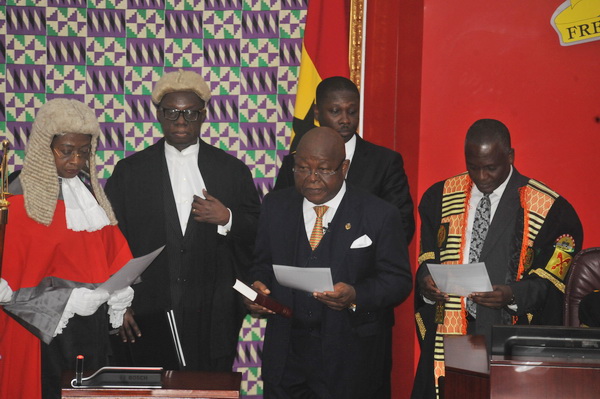
Minority to restrain Speaker from multiple swearing-in
The Minority in Parliament has resolved to head to the Supreme Court to pray to the apex court to depart from its earlier decision endorsing the swearing-in of the Speaker to act in the absence of the President and the Vice-President.
In an interview in Accra on Monday, a former Deputy Attorney-General and Minister of Justice, Dr Dominic A. Ayine, said the Minority in Parliament was in the process of gathering the necessary documents and evidence to file a suit at the Supreme Court.
Advertisement
He declined to state the exact date the case would be filed but said that it would be done before the second week of February 2018.
He said the Minority had expressed its preparedness to settle the matter, since the swearing-in of the Speaker as President last Saturday was the second time he had taken the oath in less than a week.
Dr Ayine said there was the need for the Supreme Court to depart from its earlier decision that the Speaker of Parliament should swear an oath before assuming the role of the President when the President and the Vice President were out of the jurisdiction and unable to perform their functions.
According to Dr Ayine, the practice was absurd and outmoded.
Professor Aaron Mike Oquaye was sworn in as acting President on Sunday, January 21, 2018 after President Nana Addo Dankwa Akufo-Addo had left the country to attend the inauguration of football legend George Weah as Liberia’s President.
Vice-President Mahamudu Bawumia is on medical leave in the United Kingdom after he had been taken ill and is yet to return home.
The President again left the country on Saturday, January 27, 2018 to attend an African Union (AU) summit in Addis Ababa in Ethiopia.
From there he will head to South Africa to attend the private funeral of music legend Hugh Masekela.
Following the departure of President Nana Akufo-Addo to Ethiopia, the Speaker was again sworn in last Saturday as President, but the Minority has expressed its dissatisfaction with the development.
Doe Adjaho
Dr Ayine said he defended the state in the case of Asare vrs the Attorney-General when the then Speaker of Parliament, Mr Edward Doe Adjaho, refused to swear the oath of office.
According to him, he was then and still of the view that there was no need for the Speaker to swear an oath.
“We are asking the court to depart from its earlier decision because of the absurdity inherent in the practice. In less than two weeks the Speaker took the oath twice and in the first instance we had to be recalled on a weekend to come back,” Dr Ayine, who is also the Member of Parliament for Bolga East, said.
Issue
Article 60 (11) of the 1992 Constitution states that “where the President and Vice-President are both unable to perform the functions of the President, the Speaker of Parliament shall perform those functions until the President or the Vice-President is able to perform those functions or a new President assumes office, as the case may be”.
Article 60 (12) further states that “the Speaker shall, before commencing to perform the functions of the President under Clause (11) of this article, take and subscribe to the oath set out in relation to the office of the President”.
Supporters of Article 60 (11) are of the view that the clause was unambiguous and straightforward.
But some Ghanaians have taken to social media to criticise the exercise.
Some see it as waste of time and resources.
Background
The first case of Asare vs Attorney-General was reported in the 2003-2004 Supreme Court of Ghana Law.
In the first case, the Supreme Court held that Article 60 (11) was inserted in the 1992 Constitution to ensure that the one who exercises the President's functions was physically present in the country.
A US-based academic, Professor Kwaku Asare, filed the writ to invoke the original jurisdiction of the Supreme Court after the then Speaker, Peter Ala Adjetey, was sworn in as President on February 24, 2003.
Prof. Asare sought for a proper interpretation of Article 60 (11).
In its ruling, the Supreme Court held that the swearing in of the Speaker in the absence of the President and the Vice -President was not inconsistent with the 1992 Constitution.
Second case
In the second case, the plaintiff, the Chief Executive Officer of Citi FM, Mr Samuel Atta-Mensah, went to court to challenge Mr Adjaho for refusing to swear the oath of office on two occasions.
Mr Atta-Mensah prayed the Supreme Court to declare as unconstitutional Mr Adjaho’s decision not to be sworn in as President before acting in that position in the absence of the President and his vice.
The Speaker had, on two occasions, refused to take the mandatory oath of office while the President, John Mahama, and his vice, Amissah-Arthur, were on official assignments.
The Supreme Court, on December 3, 2015, ordered Mr Adjaho to take the oath of the President anytime he was to act in the President’s absence.
The nine-member panel, presided over by Justice Sophia Akuffo, now Chief Justice, unanimously ruled that the Speaker’s decision not to take the Oath of the President on November 4, 2014 was in contravention of the 1992 Constitution.



